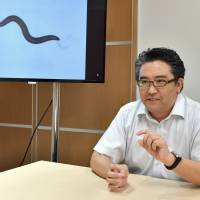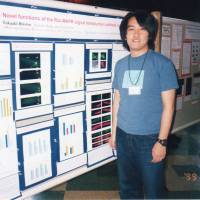Call it worm power.
Takaaki Hirotsu is trying to harness the power of the nematode worm — a tiny, transparent roundworm that lives in soil or water — to detect all forms of cancer at their earliest stages.
The use of nematodes for superearly cancer detection — a project not being undertaken by anyone else at the moment — could dramatically change the way cancer is screened and treated, both in Japan and overseas.
The 45-year-old biologist stunned the world in March 2015 when, as a researcher at Kyushu University, he announced in a science journal his discovery of the nematode's unique ability to detect the odors of cancerous cells. The research, published in Plos One, said the roundworm was found to be attracted to diluted urine samples of cancer patients and tended to quickly home in on them while moving away from the urine of healthy people.
The scent detection worked with about 95 percent accuracy, a remarkable result compared with other tumor-marker diagnostic tests using blood samples, according to the paper.
Now, 2½ years later, he runs his own venture, Hirotsu Bio Science, where he collaborates with more than 20 hospitals and cancer research institutions nationwide to conduct clinical trials for this novel cancer-screening method.
He aims to launch a diagnostic kit — N-Nose — by early 2020, with the goal of eventually making it the predominant first-stage screening tool in Japan and abroad.
Hirotsu's interest in the nematode worm, which measures about 1 mm long, spans more than two decades, dating back to the late 1990s, when he was in a master's program in biology at the University of Tokyo, commonly known as Todai. His primary research interest at the time was the mating behavior of the nematode worm — which is either male or hermaphrodite. A hermaphrodite nematode has both male and female reproductive organs and can self-reproduce.
"The nematode worm is mostly hermaphrodite and can create its clones," he said. "To boost its survivability in the environment, it only occasionally mates with a male. When that happens, the male nematode circles around the hermaphrodite one, which is kind of like the mating dances of fish and other animals, though not as conspicuous. I found that interesting and wanted to find out why."
But it was a secondary, side theme given by his Todai professor that really opened up his research opportunities: scent.
Using the worm, he established that a well-known cancer protein called Ras is activated by the scent stimuli — a discovery that was published in the journal Nature in 2000. For years after that, he continued to research smells, using the nematode as a model organism.
"People's like or dislike of the same smell changes depending on its concentration," he said. "Indole, for example, is an aromatic substance that, when diluted, smells like jasmine. But when it's in a concentrated form, it smells like feces. I found such things amazing, and did countless experiments on how the worm reacted to the same aromas differently as their concentration changed."
It was only in 2013 when Hirotsu — who until then considered himself a basic research scientist — began studying whether the worm can be used to sniff out cancer. It was after a doctor who studied the use of dogs for cancer detection asked him whether it was possible.
Dogs have long been known for their ability to smell cancer, even in its early stages, though it is not known exactly why they are so good at it. One promising theory is that they can smell a mixture of gases discharged only by cancerous cells. But training such specialist dogs is an expensive undertaking, and there are currently not nearly enough canines capable of screening everyone in Japan.
"Since I was confident that I had done more tests, and was more skilled at fine-tuning them, on the worm's reaction to smells than anybody else, I thought I would be the first one to find out whether it would work (for cancer detection)," he said.
And so he did. He says he is now convinced that nematodes are the best cancer screening tool. The worms are cheap and easy to keep, and are just as good as — if not better than — dogs in their sensitivity to smells, he said.
But why are nematodes attracted to cancerous cells? While the precise reason is unknown, they seem to hate humans in general, as they shy away from any sample type, be it urine, saliva or human tissue, he said.
One potential reason is that cancer cells produce certain odors that smell a lot like the food of nematodes, he said, adding that they feed on E. coli and other bacteria.
"It could be possible that the chemicals discharged by cancer cells smell like their food and they are carried through the bloodstream into the urine of cancer patients," he said.
Hirotsu wants to make N-Nose the universal, first-stage screening tool for everyone submitting just a tiny urine sample. And for a reasonable price, too — less than ¥10,000. Keeping the price down is one reason he decided to set up his own venture and became its CEO in August 2016, instead of having others run the business. (He disbanded his previous venture, which he set up in late 2015 and asked someone else to head, after clashes over management policy.)
Currently, C. elegans, the nematode's scientific name, can detect whether or not someone has cancer, but not the disease's location. Hirotsu, though, is working on engineering nematodes that react to specific types of cancer.
"The way cancer smells is said to be different according to cancer types," he said. "So it's theoretically possible that, once someone is confirmed to have cancer using the wild-type C. elegans, we can find out what type, using genetically modified nematodes that react to particular cancer types."
He said his research priority is creating a series that can single out pancreatic cancer because it is the hardest cancer to detect early on and is known for its poor prognosis.
One serious issue N-Nose could raise is that, because the worm's ability is so exceptional, and because it can detect cancer at such an early stage, it may not be possible to confirm the results using conventional tests that are available now. This could result in a situation where someone tests positive in N-Nose but is left with no options to find out what type of cancer they have or to get it treated.
To address such concerns, Hirotsu is preparing to set up an academic group involving doctors, ethicists and psychologists to create guidelines on how to explain the test results to people.
"We need to decide beforehand what kind of explanations the doctors will give to patients, what kind of exams to take next, and what to do when the patients test negative in the follow-up exam," he said.
But that does not discount the value of the nematode test itself, claimed Hirotsu, who also plans to roll out the diagnostic kit overseas by around 2020.
"As a nematode researcher, I want everyone's cancer to be detected early, instead of late," he said.
That, he believes, will change people's perception of cancer — from the incurable to the curable.
"Right now, getting a cancer diagnosis is like a death sentence for many," he said. "Many people cite the fear of a diagnosis as a reason to avoid screenings. But when our test becomes widely available, more people will have their cancers discovered and cured. The time will come when people will feel happy to get a cancer diagnosis. It would change the way people look at cancer. It would help enrich people's lives."
"Generational Change" is a series of interviews, profiling people in various fields who are taking a leading role in bringing about changes in society.
Key events in Hirotsu's life
1972 Born in Suo-Oshima, Yamaguchi Prefecture
1995 Graduates from the University of Tokyo, faculty of biology
1997 Completes a master's degree program with a focus on biochemistry at the university
1997 Joins Suntory Inc.
1998 Leaves Suntory, starts a Ph.D. program at the University of Tokyo
2000 Publishes a paper on cancer protein Ras
2001 Receives a Ph.D. in science from the university
2004 Becomes a postdoctoral research fellow at Kyoto University
2005 Joins Kyushu University as an assistant professor
2016 Establishes Hirotsu Bio Science Inc. and becomes CEO




















With your current subscription plan you can comment on stories. However, before writing your first comment, please create a display name in the Profile section of your subscriber account page.